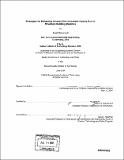Strategies for mitigating adverse environmental impacts due to structural building materials
Author(s)
Chaturvedi, Swati, 1976-
DownloadFull printable version (5.232Mb)
Other Contributors
Massachusetts Institute of Technology. Technology and Policy Program.
Advisor
John A. Ochsendorf.
Terms of use
Metadata
Show full item recordAbstract
This thesis assesses the problem of adverse environmental impacts due to the use of Portland cement and structural steel in the construction industry. The thesis outlines three technology and policy strategies to mitigate these impacts: 1. Reduce consumption; 2. Select materials to minimize impacts; and 3. Explore alternative new materials that have lesser impacts. The main findings and recommendations in each of these areas are as follows: Reduce Consumption: While absolute consumption of materials will grow with a growing population, recycling and reuse of structural members can reduce use of virgin material. Since recycling is already widely practiced, reuse of structural members is the primary means of further reducing consumption. Barriers to reuse can be eliminated by establishing design standards and regulations for reuse of structural sections, and creating functioning markets for re-useable sections. Select materials to minimize impacts: While designers are keen to select materials with minimum impacts, they do not have appropriate education or tools for the purpose. Standardization and simplification of Life Cycle Assessment (LCA) tools, and education of designers are identified as the main areas for improvement. The main recommendations are: i) standardize LCA tools; reduce the number of impact categories, make the categories understandable and incorporate uncertainty data and ii) establish programs for educating designers about materials selection tools. Alternative new materials: New materials with lesser impacts need to be explored. The main recommendations in this area are: i) conduct life cycle assessments of new materials to determine environmental credentials over their lifetime and (cont.) ii) establish appropriate policies enabling market adoption of alternative new technologies. The life cycle assessment of magnesia cement (a mix of cement containing reactive magnesium oxide) is carried out. The assessment concludes that magnesia cements could be a more environmentally friendly alternative than ordinary Portland cement. In summary, this thesis shows that the current consumption trends are not sustainable. The large volumes of construction materials consumed annually may lead to irreversible changes in the natural environment. Alternatives to current practices urgently need to be found.
Description
Thesis (S.M.)--Massachusetts Institute of Technology, Engineering Systems Division, Technology and Policy Program, 2004. Includes bibliographical references (leaves 90-93).
Date issued
2004Department
Massachusetts Institute of Technology. Engineering Systems Division; Technology and Policy ProgramPublisher
Massachusetts Institute of Technology
Keywords
Technology and Policy Program.